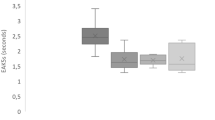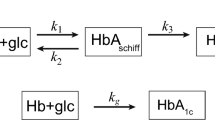Abstract
IN the tropics and semitropics, unusually high values for erythrocyte sedimentation-rates are common among apparently healthy individuals. Thus, among seventy-five medically fit young Indian medical students, the mean rate (Wintrobe's method)1 was 11.2 ± 9.4, range 0.5–30 mm.; high values are assumed to be pathological, although the cause was unknown2.
This is a preview of subscription content, access via your institution
Access options
Subscribe to this journal
Receive 51 print issues and online access
$199.00 per year
only $3.90 per issue
Buy this article
- Purchase on Springer Link
- Instant access to full article PDF
Prices may be subject to local taxes which are calculated during checkout
Similar content being viewed by others
References
Wintrobe, M. M., “Clinical Haematology” (3rd edit., Kimpton, London, 1952).
Khanna, L. C., and Sachdev, J. C., Ind. Med. Gaz., 81, 296 (1946).
Keys, A., Brozek, J., Henschel, A., Michelson, O., and Taylor, H. L., “The Biology of Human Starvation” (Univ. Minnesota Press, Minneapolis, 1950). Thrussell, L. A., and McCance, R. A., “Studies of Undernutrition” (Wuppertaal, 1946–49). Med. Res. Coun. Spec. Rep. 275 (H.M.S.O., London, 1951).
Author information
Authors and Affiliations
Rights and permissions
About this article
Cite this article
WALKER, A., FLETCHER, D., REYNOLDS, P. et al. Reduction to Normal Levels of the High Erythrocyte Sedimentation-Rates in Apparently Healthy South African Bantu Men. Nature 177, 480–481 (1956). https://doi.org/10.1038/177480b0
Issue Date:
DOI: https://doi.org/10.1038/177480b0
Comments
By submitting a comment you agree to abide by our Terms and Community Guidelines. If you find something abusive or that does not comply with our terms or guidelines please flag it as inappropriate.



